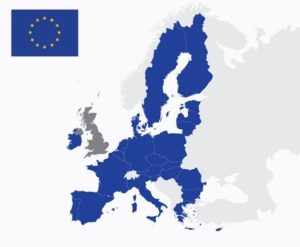
Hold your horses! There has been a positive Decision on business method related patent applications from the EPO’s Boards of Appeal: https://www.epo.org/law-practice/case-law-appeals/recent/t141749eu1.html
The Decision is an Appeal from the EPO’s examining division 1958, which is notorious for considering that, more or less, all patent applications before them can be considered akin to notorious prior art (plus business method specifications). I do not know the refusal rate of this examining division, but I would guess over 80%. Perhaps Tony Afram with the amazing technology at ipQuants AG could provide some insight on the refusal rates of this examining division or in the IPC technical field G06Q20/00.
I have copied a bunch of the reasoning below because it seems to be more generally applicable than the facts of the case. I am excited by the reasoning because maybe it could bleed into other difficult technical fields at the European Patent Office like recommendation engines. Just because there is a business or administrative scheme in the background, the implementation of an idea(the “how to” of an invention) is often technically complex. I like the idea in the Decision of genuinely trying to divide out which parts of a invention would have been at the behest of the business side (or the administrative side or whichever non-technical discipline) and which parts require technical knowledge that has not been led by the men/women in grey suits.
Usually, examining divisions, especially in the business subject matter area, take an “in for a penny, in for a pound” approach to assessing non-technicality. Under this approach, any sniff of non-technical (e.g. business) subject matter results in the whole claim going in the non technical bucket – minus the words computer or processor or network (or some other nonce computer term) – which are, of course, notoriously well known. In this new Decision, a more nuanced approach is suggested that really tries to consider the limits of the capabilities of the notional businessperson.
Similarly liberal Decisions from the Boards of Appeal have come out before, which were along these lines. In T/0136/13, the Board writes:
“3.4 According to the Comvik approach (T 641/00 – Two identities/COMVIK), non-technical features cannot contribute to inventive step. Instead, the non-technical features may legitimately appear in the formulation of the problem as part of the framework of the technical problem to be solved. Very often, the problem takes the form of a requirement specification that the skilled person has to implement. The first step in formulating the technical problem is, thus, to define the non-technical features of the invention.
3.5 In doing that, it may be helpful to consider the notional business person defined in T 1463/11 (Universal merchant platform /Cardinalcommerce). Anything that can be formulated by the business person is non-technical and part of the requirement specification”.
Also in T 0817/16:
“3.12 …A useful test for determining whether such technical considerations are present is to ask whether the non-technical features would have been formulated by a technical person rather than by a non-technical person or persons (see e.g. Decisions T 1214/09 of 18 July 2014, reasons 4.8.8; T 1321/11 of 4 August 2016, reasons 5.3.5; T 1463/11 of 29 November 2016, reasons 20 and 21; and T 136/13 of 11 September 2018, reasons 3.6). This is not an enquiry into the actual state of technical or non-technical knowledge at the effective filing date; the question is rather whether the knowledge required for coming up with the non-technical features in the particular case is of a kind that only a technical person, i.e. a person not working exclusively in areas falling under Article 52(2) EPC, could possess”.
I have tried these arguments on many occasions and have mostly received a refusal Decision slapped around my chops in reply. It would be great if the Boards of Appeal could consolidate, and push down to examining divisions, case law that takes a more real-life view on where the invention is coming from – the admin people or the research people. Taking an example from personal experience and in the field of search engines: if the invention is conceived by inventors holding PHDs in artificial intelligence, are you sure that this should be dismissed as having no technical merit? Worse still, should the EPO be telling these inventors that they have spent their careers playing with mere administrative schemes?
For those patent attorneys in fields walking the line between the technical and the non-technical, I hope you can use some of the nuggets from this Decision that are copied below:
“The examining division argued that no technical problem was solved by the differences over D1, which were only cognitive business aspects providing no technical contribution. The problem to be solved was therefore merely to implement the idea of defining the entry point of the transaction as the property of the customer which was an obvious automation not modifying the standard and expected intrinsic behaviour of the technical features of D1 (see page 3, last paragraph of the decision).
The notional business person, as introduced in T 1463/11 (Universal merchant platform / CardinalCommerce), knows all about the business related requirements specification and knows about the fact that such business related concepts can be implemented on a computer system (stand-alone or networked, including the Internet). What the notional business person does not know, however, is how exactly it can be implemented on a computer system. This is in the sphere of the technical expert and subject to the assessment of inventive step (see T 1082/13).
In the Board’s view, in the present case the notional business person might come up with the abstract idea of avoiding the customer having to provide PIN and account information to the merchant. Even when considering this to be an abstract business concept for carrying out POS transactions, it cannot however be convincingly argued that it would be sufficient to implement this idea on a standard general purpose mobile POS terminal infrastructure as known from D1 with standard programming skills. It requires a new infrastructure, new devices and a new protocol involving technical considerations linked to modified devices and their capabilities as well as security relevant modifications of the transfer of sensitive information using new possibilities achieved by the modifications to the mobile POS infrastructure.
This goes beyond what the notional business person knows, but rather concerns technical implementation details (how to implement) which are more than a straight-forward 1:1 programming of an abstract business idea. Just as T 1463/11 (supra) considered the security relevance of centralising authentication services in view of avoiding maintenance of software plug-ins in merchant computers contributed to the technical character, the Board considers the security relevance of the modifications according to point 4 above contribute to the technical character of the present invention“.

